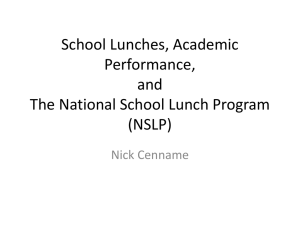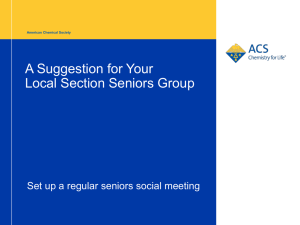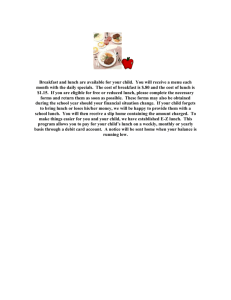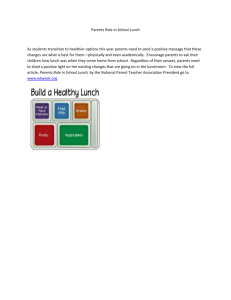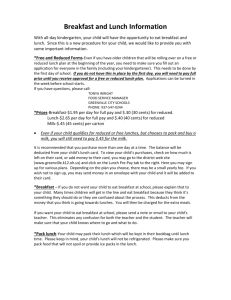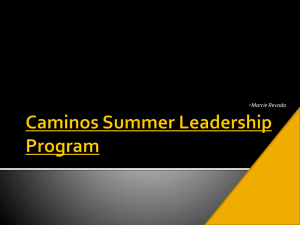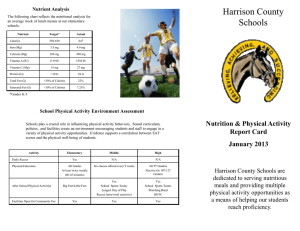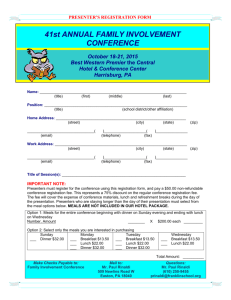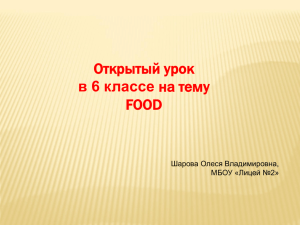SS 14 SUSTAINABLE TECHNOLOGIES FOR AGRO
advertisement
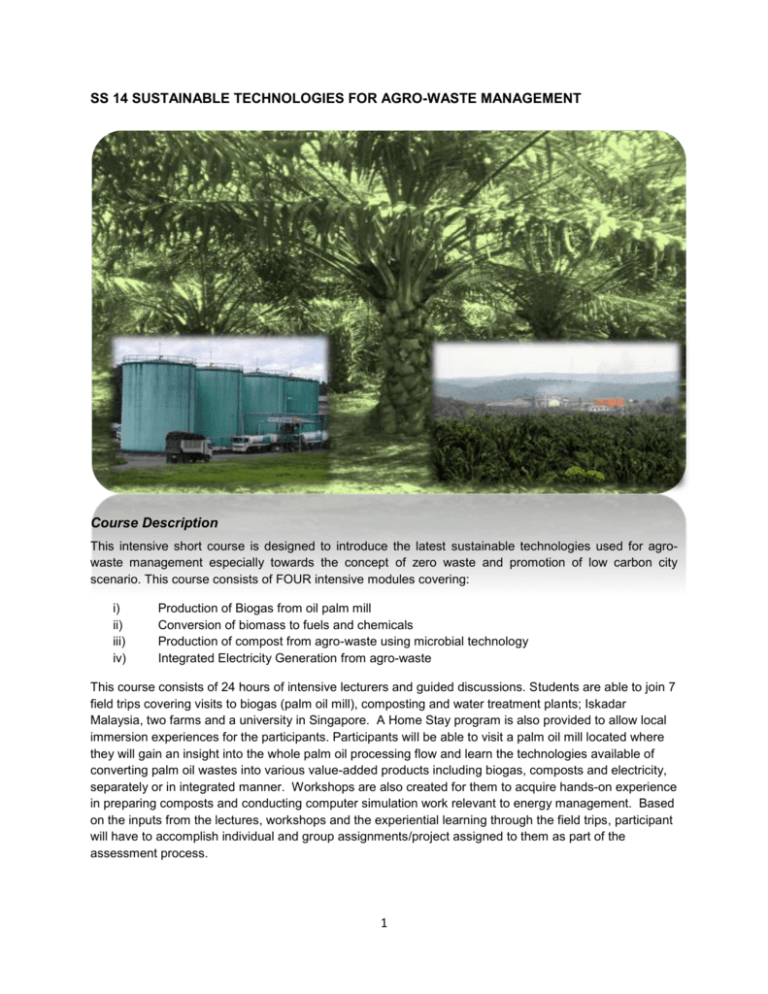
SS 14 SUSTAINABLE TECHNOLOGIES FOR AGRO-WASTE MANAGEMENT Course Description This intensive short course is designed to introduce the latest sustainable technologies used for agrowaste management especially towards the concept of zero waste and promotion of low carbon city scenario. This course consists of FOUR intensive modules covering: i) ii) iii) iv) Production of Biogas from oil palm mill Conversion of biomass to fuels and chemicals Production of compost from agro-waste using microbial technology Integrated Electricity Generation from agro-waste This course consists of 24 hours of intensive lecturers and guided discussions. Students are able to join 7 field trips covering visits to biogas (palm oil mill), composting and water treatment plants; Iskadar Malaysia, two farms and a university in Singapore. A Home Stay program is also provided to allow local immersion experiences for the participants. Participants will be able to visit a palm oil mill located where they will gain an insight into the whole palm oil processing flow and learn the technologies available of converting palm oil wastes into various value-added products including biogas, composts and electricity, separately or in integrated manner. Workshops are also created for them to acquire hands-on experience in preparing composts and conducting computer simulation work relevant to energy management. Based on the inputs from the lectures, workshops and the experiential learning through the field trips, participant will have to accomplish individual and group assignments/project assigned to them as part of the assessment process. 1 Learning Outcomes By the end of the course, participants will be able to: 1) describe and elaborate the sustainable technologies available for processing agro-waste into value-added product including biogas, fuels, chemicals and composts 2) describe and elaborate the sustainable technologies available to manage integrated electricity generation for sustainable energy supply 3) able to produce composts from agro-waste 4) able to conduct basic simulation on integrated electricity generation 5) able to design the basic plant for biogas production Course Outline 9 Lectures on Sustainable Technologies for Agro-waste management including turning agro-waste to biogas, agro-waste to composts, agro-waste to electricity for export to grid 4 Hands-on Workshop 3 Individual Assignments & 1 Group-Projects; Group Discussion & Independent Preparation 7 Field Trips in Johor (Johor Bahru, Batu Pahat, Kluang, Iskandar Malaysia) and Singapore. These include field trips to biogas, composting and water treatment plants; and a 3-days-2-nights Home Stay Program in Batu Pahat,. Assessment will be based on the individual assignments, group projects and presentation that are assigned to them within the duration of the program. Course Instructors Prof. Dr. NorAishah Saidina Amin (Prof NASA) Assoc. Prof. Dr. Firdausi Razali Assoc. Prof Dr. Lee Chew Tin Dr. Haslenda Hashim Assessment Individual Assignment s Group Project Report Group Presentation 30% (3x 10%) 40% (1 x 40%) 30% (1 x 30%) Assessment will be based on individual and group participation as well as oral presentation related to the projects that are assigned within the duration of the program. 2 Lecturers’ Profile Lecturer 1: Prof. Dr. NorAishah Saidina Amin (Prof NASA) Professor Dr. NorAishah Saidina Amin (Prof NASA) is the head of Chemical Reaction Engineering Group (CREG) at the Faculty of Chemical Engineering, Universiti Teknologi Malaysia. Her field of expertise is in catalytic reaction engineering and modeling of chemical reaction systems. She is involved with research development and consultancy (RD&C) of methane, palm oil, glycerol, and lignocellulossic biomass conversions to important chemicals such as hydrogen, syngas, C2+ and liquid fuels. Her involvement with these projects includes supervision at the postgraduate level. CREG lab is equipped with catalyst synthesis apparatus, reactors for catalyst testing and also on/off-line analytical equipments for both gas and liquid phases. For modeling, software packages for design of experiments, Matlab, Polymath and Artificial Neural Network are utilized. Prof NASA has won numerous national and international accolades for her research. She has also written many articles in international refereed journals and has also been appointed as reviewer for journals as well, external and internal examiners for postgraduate theses. Lecturer 2: Assoc. Prof. Dr. Firdausi Razali Assoc. Prof. Dr. Firdausi Razali completed his first degree (Microbiology) at Universiti Kebangsaan Malaysia and his Master (Biochemical Engineering) at the University of London. He completed his PhD in Biochemical Engineering from the University of Waterloo, Canada. His has extensive experience in bioreactor analysis and design. He works closely with a UKbased consultant to facilitate local palm oil plantations in carbon credit projects to reduce biomethane release that include co-composting of empty fruit bunch (EFB) with palm oil mill effluent (POME), and entrapment of biogas from anaerobic tank. He also engaged in a comparative study of biomethane usage in palm oil mills in Southern Thailand and Malaysia. As the principal of a residential college in UTM, he actively engages in community services and that relevant to promoting green technology locally and abroad. He has led international trips to countries including Indonesia, Thailand, Brunei, Vietnam, Cambodia, China, Taiwan, Hong Kong, Australia, New Zealand, and the Philippines. His research also focuses on application of effective microorganisms (EM) for environment and agriculture, bioreactor operation and design, renewable energy form agro-sources, good manufacturing practices and safety analysis for industry. He has delivered around 40 short courses on EM application, awareness of biotechnology, and bioreactor operation to publics and privates sectors. He is now serving as an associate professor at the Dept. of Bioprocess Engineering, Faculty of Chemical Engineering, UTM. He has more than 10 yrs of teaching experience in postgraduate and undergraduate programs and supervised 13 postgraduate students (2 Ph.Ds, 11 Masters). Lecturer 3: Assoc. Prof. Dr. Lee Chew Tin Dr. Lee is the associate professor from the Department of Bioprocess Engineering, Faculty of Chemical Engineering, Universiti Teknologi Malaysia (UTM). She has 10-years of experience in teaching core Chemical Engineering subjects. Currently, her research interests focus on the areas of converting agro-waste in to compost using microbial technology and metabolite profiling of soil and composts. She is one of the team members in the international project 3 sponsored by JICA Japan to develop Iskandar Malaysia into a low carbon city, she focuses on solid waste management from agro-wastes. She has published high impact journals in relevant to microbial enzyme technology and protein engineering. She obtained her PhD from University of Cambridge, United Kingdom in Biochemical Engineering. She is a registered engineer with the Board of Engineers Malaysia (BEM) and Associate Member of IChemE. Currently, she also serves as one of the Regional Managers in UTM’s Office of International Affairs. Lecturer 4: Dr. Haslenda Hashim Dr. Haslenda Hashim is the R&D Manager for Process Systems Engineering Centre (PROSPECT), UTM. She received her Bachelor’s and Master’s degree in Chemical Engineering from UTM and PhD from University of Waterloo, Canada. She specialises in process planning/scheduling, modelling, simulation and optimization. Her research activities are focused on the national CO2 mitigation strategy, Feed-in Tariff for the renewable electricity generation, zero-waste processes, waste to energy and water minimization. Dr. Haslenda has been providing training and technical consultancy services to the industry and the government agencies such as the Malaysia Energy Centre (MEC), Economic Planning Unit (EPU), Ministry of Natural Resources and Environment (NRE), Department of Environment (DOE), the national rice agency (BERNAS), national palm oil plantation agency (FELDA), and many more companies. Her work in Renewable Energy (RE)-Integrated Electricity Generation and Water Minimisation has been successfully filed for patents. Dr. Haslenda is the technical expert for green technology fund scheme (GTFS) and the recipient of 2009 Renewable Energy Research Program award from the National Science Council of Taiwan. She is a registered engineer with the Board of Engineers Malaysia (BEM), Associate Member IChemE and a member of Malaysian Energy Professionals Association (MEPA). 4 Course Weekly Schedule DAY Day 1 Sun Day 2 Mon Day 3 Tue TIME 1000 1230 1400 1500 2100 0700 0830 1230 1400 1600 1800 2100 0800 0900 1030 1100 1230 1400 Day 4 Wed 1700 1730 0800 0900 1030 1100 1230 1400 Day 5 Thurs 1700 1730 0800 0830 1230 1500 Day 6 Fri 1700 1730 0730 1030 1230 1400 1700 ACTIVITIES WEEK 1 ARRIVAL at UTM International City Campus, Kuala Lumpur. & CHECK-IN to Hostel in UTM. Lunch UTM CITY CAMPUS TOUR SOCIAL VISIT to KL TWIN TOWER (F&E) UTM Bus Back to Hostel Breakfast & Check-out DEPART TO UTM SKUDAI CAMPUS, Johor. Welcoming Lunch COURSE INDUCTION AT FACULTY UTM SKUDAI CAMPUS TOUR Dinner in Jusco Hyper Market Return to Hostel Breakfast LECTURE 1: Overview on Agro-waste Management Technology, by Assoc. Prof. Dr. Firdausi Razali Tea Break LECTURE 2: Production of Biogas from Palm Oil Mill and other Biomass, by AP Dr. Firdausi Razali Lunch GROUP PROJECT ON BIOGAS PRODUCTION. Discussion guided by AP Dr. Firdausi Razali & Assistant Break Return to Hostel Breakfast LECTURE 3: Biomass Conversion Technologies to Fuels & Chemicals, by Prof. Dr. NorAishah Saidina Amin Tea LECTURE 4: Biomass Conversion Technologies to Fuels & Chemicals (con’t), by Prof. Dr. NorAishah Saidina Amin Lunch Assignment 1: BIOMASS CONVERSION TECHNOLOGIES TO FUELS & CHEMICALS. Discussion guided by Prof. Dr. NorAishah Saidina Amin (Prof NASA) & assistant Break Return to Hotel Breakfast FIELD TRIP 1: BIOGAS PRODUCTION PLANT, MASAI, JOHOR, Guided tour by Lecturer/Assistant Lunch BRIEFING ON UTM LIBRARY’S FACILITIES AT PSZ LIBRARY Break Return to Hotel Breakfast, DEPARTURE FOR SINGAPORE FIELD TRIP 2: INDUSTRIAL VISIT, SINGAPORE (Lecturer & Assistant) Lunch FIELD TRIP 3: VISIT TO NUS/NTU, SINGAPORE Dinner, F&E Time Return to Hostel UTM 5 Meals Lunch F&E (Free & Easy) Breakfast Lunch F&E Breakfast Tea Lunch Tea F&E Breakfast Tea Lunch Tea F&E Breakfast Lunch Tea Breakfast F&E F&E Day 7 Sat 2100 0800 0900 Day 8 Sun Day 9 Mon 0800 0900 1030 1100 1230 1400 Day 10 Tue 1700 1730 0800 0900 1200 1400 Day 11 Wed 1700 0800 0900 1230 1400 Day 12 Thurs 1800 2030 0800 0900 Day 13 Fri 1730 0730 0800 1230 1500 Day 14 Sat Day 15 Sun Breakfast RECREATION & SPORT DAY IN UTM (OPTIONAL) Activities maybe available upon requests by extra arrangement & cost (E.g. Equestrian/Canoeing/Cycling/Horse-riding) Free & Easy WEEK 2 Breakfast LECTURE 5: Application of Microbial Technology on Agrowastes Management, by Assoc. Prof. Dr. Lee Chew Tin Break (F&E) LECTURE 6: Application of Microbial Technology on Composting, by AP. Dr. Lee Chew Tin Lunch (F&E) ASSIGNMENT 2: COMPOSTING FROM AGROWASTE. Discussion guided by AP Dr. Lee Chew Tin & Assistant Tea Return to Hostel Breakfast HANDS-ON WORKSHOP 1: Composting of Agro-waste using Effective Microorganism, by Lecturer/Assistant Lunch (F&E) PREPARATION FOR GROUP PROJECT/ASSIGNMENTS (IN LIBRARY) Return to Hostel Breakfast FIELD TRIP 4: BIOFERTILIZER COMPANY, JOHOR BAHRU (Guided tour by Lecturer/Assistant) Lunch FIELD TRIP 5: ISKANDAR MALAYSIA DEVELOPMENT AGENCY (IRDA) & ISKANDAR MALAYSIA – the Southern Economic Corridor (Guided tour by Lecturer/Assistant) Dinner at Danga Bay Return to Hostel UTM Breakfast PREPARATION FOR GROUP PROJECT/ASSIGNMENT (IN LIBRARY) Return to Hostel UTM Breakfast FIELD TRIP 6: INTEGRATED FARM & COMPOSTING PLANT, BATU PAHAT, JOHOR (Guided tour by Lecturer/Assistant) Lunch in Batu Pahat 3 Days- 2- Nights HOME STAY PROGRAM in Batu Pahat 3 Days- 2- Nights HOME STAY PROGRAM in Batu Pahat 1330 1530 1800 1930 3 Days- 2- Nights HOME STAY PROGRAM in Batu Pahat Depart for UTM FIELD TRIP 7: ZENXIN ORGANIC FARM, Kluang Dinner at Restaurant in Zenxin Organic Farm, Kluang Return to hostel UTM 6 F&E F&E Breakfast Tea Lunch Tea F&E Breakfast Lunch F&E Breakfast F&E F&E F&E Breakfast F&E Package included Package included Package included F&E Day 16 Mon 0800 0900 1030 1100 1230 1400 Day 17 Tue 1700 1730 0800 0900 1030 1100 1230 1400 1730 Day 18 Wed Day 19 Thurs Day 20 Fri Day 21 Sat 0800 0900 1200 1500 1600 1630 1700 1900 2230 WEEK 3 Breakfast LECTURE 7: Integrated Electricity Generation from Agro-waste for Sustainable Energy Supply, by Dr. Haslenda Hashim Tea Break LECTURE 8: by Dr. Haslenda Hashim Lunch ASSIGNMENT 3 : INTEGRATED ELECTRICITY GENERATION. Discussion guided by Dr. Haslenda Hashim and Assistant Break Return to Hostel Breakfast HANDS-ON WORKSHOP 2: Hands-on exercises using GAMS, by Lecturer/ Assistant Tea WORKSHOP 2 (CON’T) Lunch PREPARATION FOR GROUP PROJECT/ASSIGNMENTS Return to Hostel UTM PREPARATION FOR GROUP PROJECT/ASSIGNMENTS/PRESENTATION PREPARATION FOR GROUP PROJECT/ASSIGNMENTS/PRESENTATION Breakfast GROUP PRESENTATION & EVALUATION Lunch PROGRAM FEEDBACK & SHARING CLOSING CEREMONY & CERTIFICATE PRESENTATION Tea Return to Hostel FAREWELL DINNER & CULTURAL EXCHANGE PROGRAM Return to Hostel Check-out DEPARTURE 7 Breakfast Tea Lunch Tea F&E Breakfast Tea Lunch F&E F&E F&E Breakfast Lunch Tea Dinner
